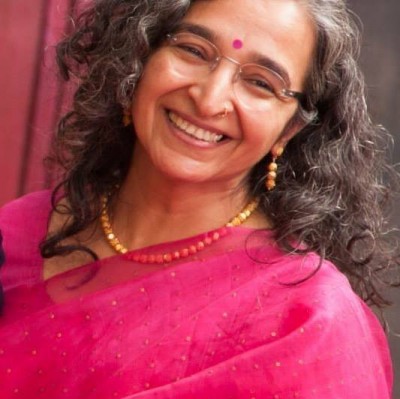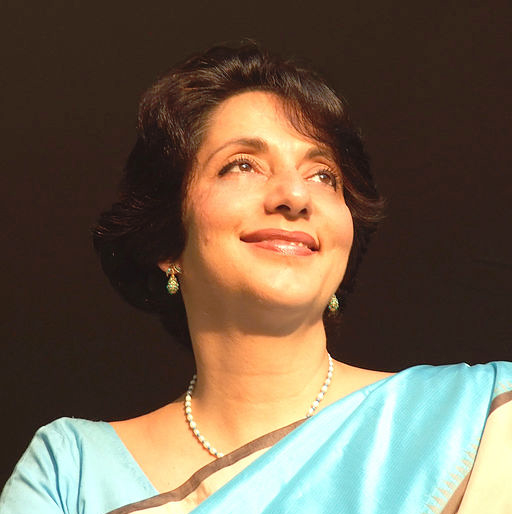ILMUNC India guest speaker series
April 14, 2016

Photo Credit: Creative Commons
Anju Dubey Pandey speaks out against a culture of silence
“We have the capacity to change the rest of the world, but not India,” a male Model United Nations delegate replied in response to ILMUNC guest speaker, Anju Dubey Pandey’s question of whether an individual can make a difference in society. Anju Pandey, now Programme Officer of UN Women India, responded to his comment by sharing her story of how she helped tackle the culture of silence in India’s conservative society, which underpins gender-based violence. Her speech proved to her audience that an individual has the power to create change.
At the start of her speech, Anju Pandey recalled her first encounter with gender-based violence. A college student at the time, she was welcomed by two unexpected visitors–a small girl with tattered clothes and a sleep-deprived young man. They had recently crossed the border to India after escaping a Nepalese brothel. A nervous Anju Pandey, who knew that she was breaking dorm rules, allowed the young girl to temporarily stay at her dormitory. Although the man promised to, he never returned. Anju Pandey knew that she would be severely punished if the girl continued to stay, but could not kick her out, as the girl only spoke broken Hindi. On the fourteenth day, Anju Pandey helped her new friend move into a local support service community. This incident opened young Anju’s eyes to the culture of silence that shrouded India.
The culture of silence in India was first spotlighted when news of the 2012 Delhi Gang Rape rippled across the world, triggering international criticism of India’s inability to address violence. The culture of silence has been preventing women from reporting gender-based violence since the early 1800s.
As men consider themselves superior to women in India, they wrongfully believe they possess the right to be authoritative and aggressive towards women. On the other hand, women believe they lack the power to stand up and speak for themselves, providing attackers justification to continue gender-based violence.
In addition, the lack of female police, limited NGOs, the arduous process of court trials, and the lack of sex education in the school curriculum lead men to “eve tease” women on the streets. While Delhi responded with disappointing yet expected silence in the aftermath of the 2012 Delhi gang rape, Anju spoke out. She and her friends decided that Delhi should be filled with the culture of integrity rather than the culture of compliance. Coining themselves as the Indian Women Press Corporation, they partnered with UNICEF and UN Women to take forward the public campaign, “UNiTE to End Violence against Women and Girls.” Additionally, as part of UNICEF India, they also launched “Time to Sound the Red Siren”. During the campaign’s early years, they would crowd popular spots like the India gate and hand out flyers and make announcements, specially focusing on sexual violence against young girls.
The 2016 theme color for the Time to Sound the Red Siren campaign is orange, which also constitutes the proud colors of India’s flag. According to Anju Pandey, this color was chosen to reflect the hope for change.
When asked on the power of campaigns to change such a deeply rooted culture of silence, Anju Pandey echoed the UN Women’s aims that “heightened public awareness can lead to increased dialogue, support the transformation of attitudes and reinforce the idea that violence can be prevented by highlighting successful violence prevention efforts and movements at all levels, with a particular focus on national and local initiatives.”
Anju Pandey mentioned that we can start to “dent” the deeply fixated culture of silence by questioning ourselves, “What is it we are learning? How are we growing up?” For Anju Pandey, these questions were key to promoting social awareness through Indian Women Press Corporation’s public campaigns and encouraging the ministers to incorporate sex education in the Delhi school curriculum. She claims that the smile on her face is becoming bigger as she begins to read less about gender-based violence cases.
Anju Pandey’s story is one of many examples that proves that an individual can make a difference, at least within their community. The culture of silence is one of many attitudes that must be reversed in Delhi. Anju Pandey concluded her speech by addressing the hundreds of students dressed in formal wear and said that it depends on the future generation to “be the change they wanted to see”.

Wikimedia Commons // CC Search
Meera Sanyal inspires ISSH MUN delegates
Meera Sanyal, former CEO and chairperson of the Royal Bank of Scotland in India, stepped down from her prestigious position of CEO to become a politician in India because she believed it was “essential to take a stand and participate constructively in the political process rather than just criticise the system.”
On November 25, four former students of the International Relations class, Hanako (12), Reshma (12), Sydney (12), and Mina (12), flew to India to participate in an Ivy League Model United Nations conference. One of the numerous prominent guest speakers at the conference was Meera Sanyal. She was one of the most highly respected bankers in India, in charge of around 14,000 people. After 30 years as a banker, in December 2013, she became a politician, a role that is not always regarded highly in India. This dramatic decision was motivated by her urge to do what she thinks is right. She said, “unfortunately our leaders have let us down, we (Indians) have really poor governments. It is not us who have let us down. But if we do not participate, and if we allow these people to continue governing us, then we will be letting ourselves down.”
True to her words, she is currently in the Aam Aadmi Party, a centre-left political party from South Mumbai that is currently the ruling party of Delhi. Meera’s background in the banking world, which ranges from Operation and IT to Investment Banking, allowed her an extensive understanding of the political, economic, and social situation of India. “Her dramatic life encouraged us to be ourselves and take actions when we need to,” said Hanako (12), one of the delegates of Jordan.
Especially in a politically male dominant country such as India, the initiatives taken by Meera towards political change in such fields are big steps towards changing the difficult situations many women face today. Unfortunately, the lack of family friendly policies remains a problem in many countries. Meera states in an interview by dna, “If a woman is socially empowered, she will become economically empowered and politically empowered.” Meera emphasized that it is the individual’s responsibility to act and do what is right, as we as a generation will determine the direction of our future.
Sydney (12), a member of the delegation said, “The message from her that stood out the most was that although we feel little and unable to make a change, it is our responsibility to take action and initiate change”.